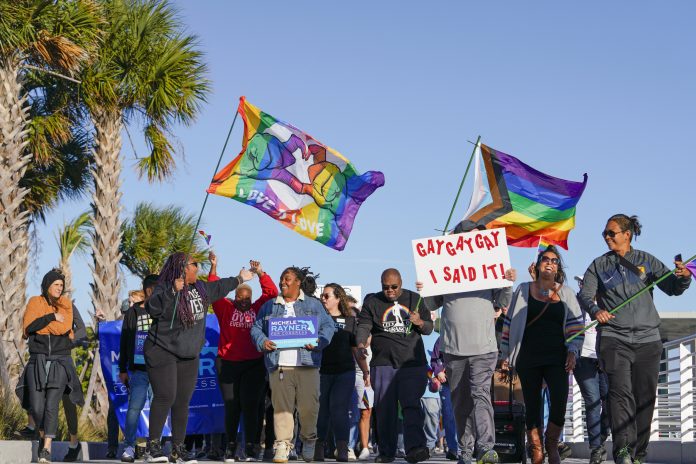Yuriko Chavez
Contributing Writer
UC Santa Barbara’s (UCSB) Resource Center for Sexual and Gender Diversity (RCSGD) raised $200 for the political advocacy group Equality Florida from April 4-22 in response to Florida’s governor signing the “Don’t Say Gay” Bill 1557, which “restricts the education of LGBTQ+ topics in the state’s public schools.” The Bottom Line (TBL) sat down with RCSGD to discuss Florida House Bill 1557, its fundraising efforts, and how else this bill could impact the UCSB queer community.
The controversial Bill 1557, or “Don’t Say Gay” Act as coined by its protestors, was signed into legislation by Florida Governor Ron DeSantis, on March 28th. It states that “classroom instruction by school personnel or third parties on sexual orientation or gender identity may not occur in kindergarten through grade 3.” Many across the country have protested the bill’s passing, citing its creation as both isolating to the LGBTQ+ community and underserving to the education of young people in Florida.
The Monday after it was passed, RCSGD Interim Outreach Coordinator, Mikayla Buhbe, organized a fundraiser for Equality Florida, which is a civil rights organization that has been combating anti-LGBTQ+ legislation since 1997.
Buhbe pondered the various ways that students at UCSB could protest against legislation that was over 2,000 miles away. She elaborated that being residents under California’s more liberal government can make it easy to “create a bubble” and forget that LGBTQ+ individuals don’t have the same rights everywhere else.
“The core goal was to give students a sense of agency to create change,” Buhbe stated about the fundraiser, “the biggest difference you can make in [during this time for the LGBTQ+ community] is give those organizations so that they can do what they need.”
After researching various different organizations, Buhbe chose Equality Florida to fundraise for because of its specific focus on legislative work, as well as its 25 years of experience.
“They’ve pushed back against [legislation] or officially overturned several laws, historically, that are in a similar genre of homophobia and transphobia,” she explained.
Bubhe described how the absence of a federally mandated sex education within schools already prevents the discussion of queer relationships, transgender content, and sexual consent. Bill 1557 would further restrict these kinds of discussions, which “poses a danger to students feeling safe in the classroom,” according to Buhbe.
Reflecting on her own experiences working with children during her summer job, Buhbe emphasized the need to have spaces where young students could learn about these themes.
“Creating the space to ask questions is so important,” she stated, “One of the other big issues is that it immediately cuts off the opportunity to ask those questions and to be safe. You can’t be safe if you don’t have all the knowledge available to you.”
Buhbe also shared her personal frustration and disheartenment over the news of how Bill 1157 was signed into legislation. After decades of progress, she explained, the news felt like things are “back at square one.”
“But, I also think it was a point of rallying,” she continued, “since we had the opportunity to make a difference. There was an aspect of like, alright, we can hold that frustration and hurt and use that to motivate us.”
In order to visibly represent the fundraiser’s progress, Bubhe began with a blank trans flag titled #ProtectQueerKids, and with every dollar donated, the donor could color in a section of the flag. In the stripes colored from donation, are the numerous drawings of wildflowers.
“The idea of having those flowers was to sort of encourage the idea that this activism can grow and that we can all grow as a community from the lessons that we’ve learned,” Bubhe commented.
When asked about the ways that the “Don’t Say Gay” bill could affect queer communities on campus, Buhbe reflected on what bills like Bill 1557 take precedent for. She warns that passing such legislation provides an opportunity for anti-LGBTQ+ voices to get louder.
Bhube also shared that news regarding the LGBTQ+ community and their rights often cause a great stir, both in support for and in inquisition of the community.
“Unfortunately, when [LGBTQ+] communities get threatened by something like this, there’s a lot of reactivity and there’s a lot of energy….some people and communities really feed off that reactivity.” stated Buhbe.
Bhube shared that she expects these kinds of conversations happen on campus and within the UCSB community, as well. Reflecting upon her personal experiences of when individuals would attempt to debate with her on queer issues, she furrows her brow.
“This is my identity. This is my community. This is not something that we get to debate as though it’s like a fun little philosophical moment that doesn’t impact real lives,” Bhube stated.
The RCSGD holds many events and discussion spacesfor LGBTQIA+ individuals and allies regarding queer issues and the community. Buhbe urges queer UCSB students to come together during times of political strife.
Smiling and nodding, Buhbe added, “That’s definitely our central goal is creating a place where our community can feel connected and empowered and safe.”
UCSB students who wish to support Equality Florida may donate or become a member, and queer students and allies who wish to be notified of RCSGD’s events may sign up for their newsletter by submitting an interest form.











